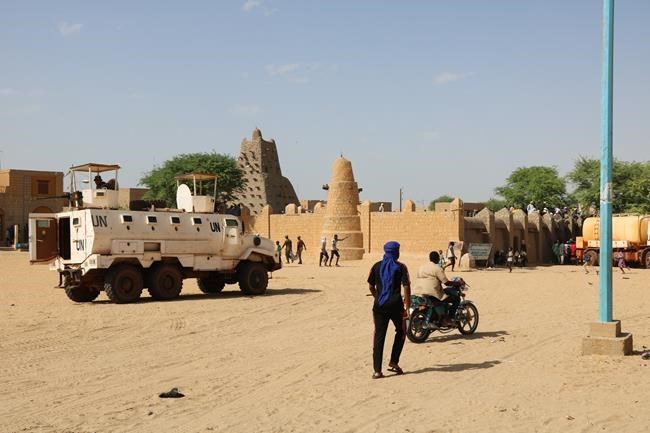TIMBUKTU, Mali (AP) — It’s been nine years since Islamic extremists in northern Mali arrested Zahra Abdou on charges of showing her hair and wearing an outfit they said was too tight.
The al-Qaida-linked militants who had seized control of this fabled desert center in 2012 whipped Abdou in front of a throng of people in her neighborhood. Older women tried to stop the flogging but were prevented by the extremists.
“I received dozens of lashes in front of a large crowd and because of the pain I passed out," she recalled. “It was a total humiliation for me. For a long time, I felt ashamed in front of the people of my neighborhood.”
The trauma still torments her, she says. Her anxiety has increased since France announced in July that by 2022. After years of leading the fight against jihadis in Mali’s north, the French military will close its bases in Timbuktu and other northern centers.
Just as the Taliban has returned to power in Afghanistan, Abdou says she fears it’s only a matter of time before the extremists who punished her again rule Timbuktu and other cities in Mali's north.
“I am afraid that the same thing will happen that took place in 2012,” she says, now 30 and still struggling with insomnia. “Because of this, I didn’t get my baccalaureate degree, I was too traumatized. I wanted to study commerce, to do business.
“Even now I have pain in my foot. I think a piece of glass from that has day is still lodged there,” she says.
For centuries Timbuktu has been a center for Islamic scholars who generally practiced a moderate form of Islam. In 2012 a new band of extremists, many from Algeria, established themselves, taking advantage of the Mali government's lack of presence in the north.
Soon the extremists began enforcing their strict interpretation of Islamic Shariah law, flogging women like Abdou and amputating the hands of accused thieves. Like the Taliban in Afghanistan, Mali's militants, known as Ansar Dine, targeted historic cultural sites that they said were idolatrous, destroying ancient, treasured mausoleums that were UNESCO World Heritage sites. They also banned music.
Women were required to wear a veil covering their heads and girls were no longer taught in the same classroom as boys.
Unlike in Afghanistan, the extremists' rule in northern Mali was brief — France led a military intervention just a year later that forced Ansar Dine from Timbuktu and other northern cities in early 2013. That same year, a woman was elected as a deputy to represent Timbuktu in Mali’s National Assembly.
But the Islamic extremists were never fully defeated, dispersing into the desert from where they launch scores of attacks on the Malian military and U.N. peacekeepers.
Timbuktu residents say the militants aren’t far from the city's edge — they’ve spotted the men with long beards inside their Toyota Hilux trucks nearby. Some of the extremists come into town to shop at the market, they say, but no one dares report them for fear of reprisals.
When France pulls its troops out of Timbuktu, the city will still be protected by Malian forces and some 800 U.N. peacekeepers, mostly from Burkina Faso. French bases in Tessalit and Kidal will also be shuttered, the French military has said.
Timbuktu Mayor Aboubacrine Cissé does not hide his unease with France's decision to end its Operation Barkhane.
“Our defense and security forces are overwhelmed by the security situation in Timbuktu and the withdrawal of allied forces such as Barkhane will leave a vacuum that can be filled by any armed group," Cisse said.
In the eight years since the extremists fled into the desert, life has returned to Timbuktu almost as before. The destroyed mausoleums have been rebuilt, music has resumed and cultural events are again held every weekend.
The impending departure of the French troops is creating fear among those in Timbuktu who have yearned for the city to regain its status as a popular international tourist destination.
For years, the city and its surrounding region hosted a popular music festival each January that drew musicians from around the globe. And before extremists started kidnapping foreigners for ransom, hundreds of backpackers flocked here, posing for photos in front of the city's sign, as Timbuktu is synonymous with one of the ends of the earth.
Salaha Maiga, a young promoter of a local music festival that had encouraged reconciliation through cultural performances, fears the French departure “will spoil everything that has been rebuilt since 2012.”
“Even today, the army does not control more than 30 kilometers (about 19 miles) outside the city of Timbuktu, and 80% of the territory surrounding Timbuktu is controlled by jihadi groups," he says.
It's an opinion shared by Abdou, the young woman who was publicly whipped in 2012. Now married, she said she dreams of having children but worries about what kind of life they would have if extremists regain control of Timbuktu.
“The jihadis are already here in Timbuktu, only they don’t have the strength to run the city,” she says. “If there are not enough military forces in Timbuktu, the extremists will definitely come back.”
___
Associated Press writer Krista Larson in Dakar, Senegal contributed.
Baba Ahmed, The Associated Press




